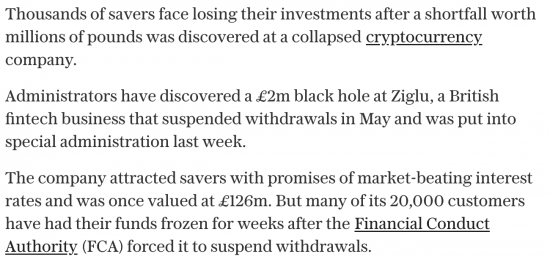As The Telegraph has noted this morning:

I am shocked, I tell you, truly shocked that a crypto company might have failed, taking its customers' funds with it. I mean, how could such a thing have happened?
I hope you get my irony.
Crypto is not fintech. It's just a massively high-risk gambling option. I am sure fools and their money will always be parted, but please do not fall for it. There is literally nothing of value in crypto, and absolutely no guarantee of value whatsoever. Nor is the backing of a state guarantee, which there is if you save in boring old pounds.
This is an occasion when being boring is wise. And sometimes the cost of being wise is worth paying.
Thanks for reading this post.
You can share this post on social media of your choice by clicking these icons:
There are links to this blog's glossary in the above post that explain technical terms used in it. Follow them for more explanations.
You can subscribe to this blog's daily email here.
And if you would like to support this blog you can, here:


 Buy me a coffee!
Buy me a coffee!

This sounds like excess wealth has been removed from the top end of town.
\o/
What is awful about this is that it should never have been allowed to be set up in the first place.
Might this be the first of many?
That is my guess.
Black Tulips = Black Crypto = Black Markets = Blackholes etc.
I have always called it corruptocurrency, it’s seems more accurate than cryptocurrency.
🙂
comment of the day
Logic suggests that nobody can offer a rate of return significantly better than everyone else
Unless of course it’s a fraud
I worked in the betting industry for many years before I went into teaching. Studying economics and financial markets, I realised quite quickly that there was very little difference between betting markets and financial markets. Both attract ‘chisellers’; unsavoury characters looking for a fast buck. In fairness, they also attract people trying to pit their wits against the maths of probability, often spending their valuable time studying the form or business performances. The former(form students) were usually decried while stock market players are generally revered, even by govs.
My point is to agree with you that a lot of gambling occurs in financial markets, but it is rarely called out as such by economists, politicians or the media. It’s about time it was.
Agreed. Thanks.
When I was 9 or 10 years old a boy brought a number of strange objects into school. They looked a bit like bakelite oven grill handles. Looking back I suspect his father worked for a failing electrical white goods manufacturer in the town. The boy didn’t know what they were but said they were rare and offered to sell them for a couple of shillings (sic) as I recall. Boys who bought them showed them off (it’s always boys who need to look cool. I didn’t have the money to look cool) and soon every boy wanted one. The price went up and the supplier was making good money. Eventually everyone had one, got bored with them and they disappeared.
I learnt a valuable lesson. A demand can always be created for an intrinsically worthless item like cryptocurrency with the promise of high returns for everyone. Like a Ponzi scheme it eventually collapses but can readily be resurrected as a different cryptocurrency.
Cryptocurrencies should perhaps be treated the same way as Ponzi schemes. And a case can surely be made for expanding the Bank of England to take over the functions of essentially parasitic commercial banks altogether. Presumably that makes me left of left of left of left? Or just a resident of cloud cuckoo land?
PS My odd name on an earlier posting was the result of an unusual typo! Sorry.
Thanks
And correct
Correct that banks are parasitic or that I’m in cloud cuckoo land? Or both? Best wishes